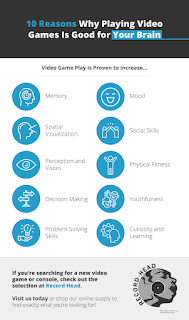Reasons Why Playing Video Games is Good for your Brain
We enjoy a good video game, whether it's an action-packed shooter or a tough strategy game.
There appears to be a new game to test every day as technology progresses and game creators continue to create new content.
Fortunately for us, there are numerous advantages to playing video games that will motivate you to continue playing – as if you needed another reason.
Video games have several good effects, ranging from improved memory and problem-solving to improved mood and social skills.
While some may believe that video games make you lethargic, hurt your brain, or disrupt your social life, they actually provide several physical, cognitive, and social benefits. When someone tells you that you play too many video games, remember this.
XEM THÊM:
Kinh nghiệm chơi ⚡️ Fantan ⚡️ Từ bậc cao thủ
Memory
Many video games necessitate careful planning and concentration.
You know how crucial it is to remember where you obtained specific resources or where you need to travel next if you've ever created your own society in Minecraft or fought for your life in Fortnite.
Video game environments are extraordinarily rich in stimuli, thanks to 3D graphics and immersive music.
Getting about in the virtual world of video games has become extremely comparable to getting around in the real world.
Exploring video game realms can, in fact, improve memory in everyday life.
You exercise your hippocampus when you have to manage several tasks and goals while traversing a virtual area.
This is the portion of the brain that converts short-term memory into long-term memory.
When a group of gamers and a group of non-gamers were assessed in memory tasks, a 2015 study from the University of California, Irvine revealed evidence for the cognitive benefits of playing video games.
Others who regularly played complex 3D video games outperformed those who did not play video games or only played simple 2D games on memory tasks connected to the hippocampus.
Non-gamers' memory improved over time when they played a difficult 3D game for 30 minutes each day, according to the study.
Memory loss is a natural part of growing older.
Regular video game play may be a terrific method to keep your mind fresh as you age, ensuring that you can always find your way around.
Decision Making
Fast-paced video games like Need For Speed or Call of Duty demand that you stay alert and make quick decisions.
These exhilarating action games can also help you enhance your decision-making skills in real life.
According to a 2010 study from the University of Rochester, gamers who like action games can make better decisions faster than non-gamers or those who prefer slow-paced video games.
Participants in the study were put through visual and aural decision-making challenges.
The action gamer group finished the tasks up to 25% faster than the other groups, although having similar accuracy.
In everyday life, faster decision-making is advantageous since you can do more when you make minor judgments quickly.
Rather than wasting time deciding which shirt to wear.
Curiosity and Learning
When you play video games, your brain is working and expanding on a basic level.
You're making new mental connections as you find out how a game works and solve riddles to conquer a level.
The more you want to win the game, the harder your brain will work and the more you will learn.
It is critical to keep your brain healthy as you age by continuing to study and stimulate it.
Many video games, such as Assassin's Creed and Grand Theft Auto, are set in different eras or historical settings.
You are not only having fun while playing these games, but you are also learning about history.
When a player appreciates the story or setting of these games, they may be interested in purchasing them.
Perception and Vision
When confronted with a complicated environment full of conflicting cues, your brain generates a perceptual template to assist you decide what's significant and what's not.
You can use this perceptual template to assess and respond to a scenario.
Playing action video games can increase a person's ability to form perceptual templates, according to a 2014 study published in Proceedings of the National Academy of Sciences of the United States of America.
This form of perceptual improvement is particularly advantageous because it is not task-specific and may be used to any situation.
High-octane video games can also help you learn to recognize patterns and different shades of gray.
Scientists previously believed that your capacity to perceive contrast could not be improved, but new findings from
Social Skills
Some say that video games lead to poor social skills or isolation, hence the social benefits of video games have been hotly contested.
Excessive video game play, on the other hand, might have detrimental social consequences, but moderate video game play can improve social skills and reduce anxiety.
When players are given the opportunity to assume fictional personas in a virtual world, they are allowed to experiment with social interactions, which teaches them what constitutes appropriate social behavior.
Those who are anxious in social circumstances may find it easier to practice social interactions in video games because there are no real-life consequences.
They can then interact with others in the real world with more confidence.
READ ARTICLES :
my-chemical-romance-how-criticized-band
my-chemical-romance-future-drop-out-boy
top-international-makeup-artists
what-are-different-types-of-modeling
natural-living-essentials






Nhận xét
Đăng nhận xét